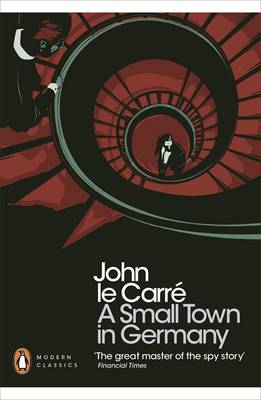 A Small Town in Germany – John le Carré
A Small Town in Germany – John le Carré
My rating: ★★★★☆
Warning: this review contains plot spoilers.
I purchased this book in a small craft fair in St Ives of Cornwall last week. It revolves around the British Embassy in Bonn in West Germany, the ‘Small Town’ of the title, in the late 1960s.
An ailing British Government are desperate to join the Common Market in Europe but due to hostility from France are overly reliant on Germany, as their only European ally, to support their membership. Sound familiar? This fictitious context struck me as strikingly similar to what the UK’s near future could soon look like after the recent EU referendum result.
However this novel was published in 1968 with le Carré firmly on his home turf of the Cold War. It sees a junior Embassy staff member, Leo Harting, go missing with a horde of files containing some of the British Government’s dearest secrets at a time of crucial Foreign Office negotiations in Brussels. Keen to prevent any harm to this Brussels bid, London sends Alan Turner to Bonn to investigate where Harting and the crucial files have got to.
His investigations initially find the Embassy and it’s daily, diplomatic life as one of dour incompetence. However through his amusingly indelicate questioning style Turner begins to build a picture of Harting as a man who slowly weeded his way into positions of undeserved trust, often through romance with female staff or even the wive’s of his male colleagues. Turner also begins to see traits of himself in the missing Harting; a man with a strong, and sometimes destructive, desire for the truth. One character describes Turner as “a man who would pull down a forest to find an acorn.”
Throughout Turner witnesses the civil unrest wrought by a German nationalist politician called Karfeld. As the fast rising Opposition leader Karfeld’s emotive speeches generate an atmosphere of violent student led protests across Germany with some uncomfortable parallels to its dark, recent past. Powerful posters of Karfeld’s populist, anti-British and quasi neo-Nazi slogans embellish Turner’s investigation, which runs against the dual clocks of an impending protest march in Bonn and the upcoming British bid in Brussels.
The search sees Turner discover the missing files and Harting’s noble aim to use them to reveal the true past of Karfeld before he gets into power. Karfeld’s past as a German war hero in Stalingrad is actually shown by British files as a cover up to hide his involvement in horrifying medical experiments during the Holocaust.
As the most frightening element of this novel, this resurgence of neo-Nazism is only matched by the ugly and complete moral flexibility of the British Embassy leaders. Despite his assurances to only want to help Turner find Harting the Embassy Head, Rawley Bradfield, is actually less than eager for Harting’s findings to find oxygen. This comes solely down to his cynical hedging of bets; as Karfeld is viewed not only as a potential future partner to be on the right side of, but also for the short term goal of not rocking the boat and upsetting the German intelligence services with Britain relying heavily on their support in their European application.
This dark conclusion builds on a common theme in le Carre’s novels which paints the world of spying as not a glamorous Bond-like jaunt, but rather a truly dangerous world of cold and unpleasant realities and if need be betrayal. Characters in this book with any professional/career success in this world of spying often carry burdens of a failure in many parts of their private lives, particularly relationships.
Overall this novel contains a surprisingly fresh story from le Carre’s early canon, especially as it was published in between the more famous Cold War thrillers The Spy Who Came in from the Cold and Tinker Tailor Solider Spy. It is a foreboding tale with its conclusion, the fate of the elusive Harting, hanging precariously in the balance until the final pages. Because of this it is a natural page turner which grips your attention from first to last.
Best Quote: ‘Then why look for him?’ – Jenny
‘Why not? That’s how we spend our lives, isn’t it? Looking for people we’ll never find.’ – Turner
Have you read this novel or any other of John le Carré’s? What did you think of it? Please leave your comments below.
